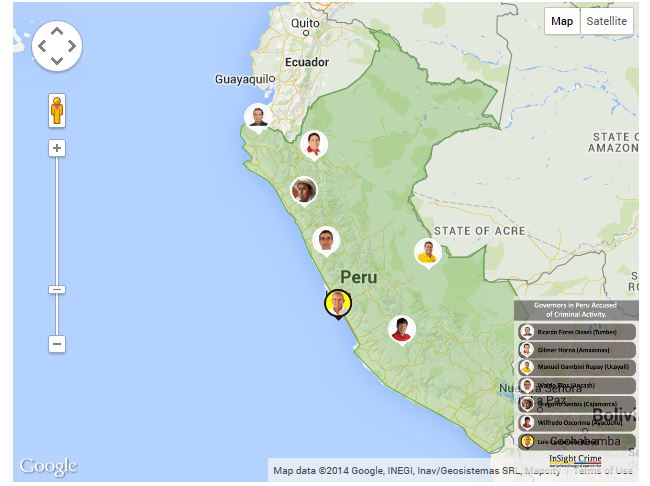Following December 7 run-off elections, Peru has now elected at least six governors under investigation or facing charges for crimes ranging from embezzlement to drug trafficking, which undermines the legitimacy of regional government in many parts of the country.
In spite of the stir created by revelations in the run-up to Peru's October elections that hundreds of candidates had either been convicted of a crime or linked to the drug trade, voters elected at least six governors allegedly involved in criminal activity. InSight Crime profiles some of Peru's new "narco-governors," as one analyst called them, as well as some of the country's other allegedly criminal elected leaders.
Ricardo Flores Dioses, Elected Governor of Tumbes
The newly elected governor of Peru's Tumbes province, Ricardo Flores Dioses, faces 70 allegations including embezzlement, money laundering, extortion and concealment. In 2008, Flores was sentenced to four years in prison for the misappropriation of public funds, but his sentence has been suspended. A large portion of his other judicial processes have been archived.
Prior to being elector governor, Flores served as mayor of the city of Tumbes for four terms. He has been linked to the fugitive former governor of Tumbes, Gerardo Viñas, who is under investigation for corruption.
Gilmer Horna, Elected Governor of Amazonas
Officially, Gilmer Horna is the owner of a bus company and a popular chain of chicken restaurants. Unofficially, he has been tied to the heroin and morphine trade in northern Peru.
Horna, who is under investigation for allegedly laundering over $3.5 million dollars, embodies the rags-to-riches story. His father died when he was a young boy and Horna was forced to drop out of school to help support his six siblings. The official story is that Horna started out as a dishwasher in a chicken restaurant in Lima, and today owns his own chain.
However, there are other theories about the source of Horna's wealth. According to an investigation by the magazine Velaverde, Horna has 12 arrest warrants against him for drug trafficking, which he has somehow managed to bury in judicial archives. The administrator of his bus company, a former priest, was captured in 2012 with two kilos of morphine after an undercover agent posing as a buyer agreed to purchase the drugs.
SEE ALSO: Peru News and Profiles
According to an anonymous source cited by the magazine, the morphine bust was not the only incident in which Horna's bus company has been tied to drug seizures. Velaverde was able to verify that on at least one occasion -- in 2013 -- anti-drug police found kilos of coca base on one of Horna's buses.
Manuel Gambini Rupay, Elected Governor of Ucayali
A former coca grower who became USAID's local poster boy for crop substitution programs, Gambini served as a mayor for two terms before being elected governor of Peru's eastern Ucayali province. He is currently under investigation for money laundering, and local activists have accused him of embezzlement and fraud.
According to official documents obtained by the Associated Press, Gambini facilitated the enrichment of associates with drug trafficking ties, and amassed a small fortune, several properties, and a soccer club while earning less than $2,000 a month as mayor. One of his associates, who served as treasurer in the district where Gambini was mayor, has been convicted of cocaine trafficking.

Waldo Rios, Elected Governor of Ancash
Although his party won over 65 percent of the vote in the coastal province of Ancash, Waldo Rios won't be allowed to take office as governor. He still hasn't finished completing his sentence for charges of accepting $10,000 from former President Alberto Fujimori's chief of intelligence, Vladimiro Montesinos, to switch to Fujimori's political party.
Gregorio Santos, Reelected Governor of Cajamarca
Like Waldo Rios, Gregorio Santos won't be taking office. The reelected governor has been sentenced to 14 months of preventative prison while under investigation for criminal conspiracy, bribery, and collusion. Santos allegedly accepted bribes from a businessman in exchange for eleven public works contracts.
Wilfredo Oscorima, Reelected Governor of Ayacucho
Wilfredo Oscorima, who allegedly drummed up support in his last campaign for governor by handing out hundred soles bills (equivalent to about $33 dollars), faces a trial for money laundering. The funds in question allegedly came from illegal gambling operations, prostitution, and drug trafficking. He has also been accused of corruption.
Luis Castañeda, Elected Mayor of Lima
Luis Castañeda, who was elected mayor of Lima, has been implicated in a corruption scandal. During his previous stint as mayor, between 2003 and 2010, three of his aides allegedly funneled over $7.2 million dollars through a shadow company with ties to a convicted drug trafficker. Castañeda managed to be officially excluded from the investigation, thanks to a court order.
New Electoral Regulations?
As the Associated Press pointed out, part of the problem stems from Peru's lax electoral requirements. Candidates don't have to list their earnings or assets in the information they submit to the National Electoral Commission, and aren't penalized for failing to report campaign donations. Convicted criminals who have served their time and been legally "rehabilitated" are not prevented from running for office.
The lack of regulations is especially concerning in light of Peru's role in the drug trade. In addition to being the world's largest producer of coca and cocaine, Peru has seen an influx of transnational criminal organizations including Mexico's Sinaloa Cartel. The number of candidates accused of corruption and drug trafficking ties in the recent elections suggests Peru may be headed down the road to narco statehood.
Three days after Peru's October 5 elections, President Ollanta Humala called on the country's Congress to review electoral legislation. He urged lawmakers to prevent candidates involved in judicial processes from participating in future elections. However, it remains to be seen whether or not Peru's legislators will put stricter electoral screening mechanisms in place. After all, they also benefit from the lack of regulations.